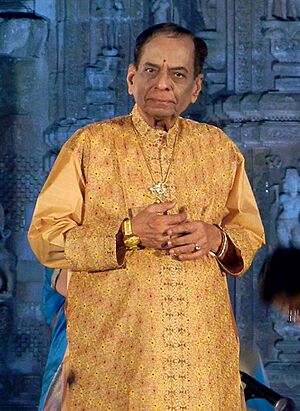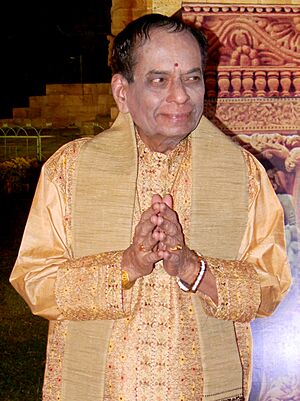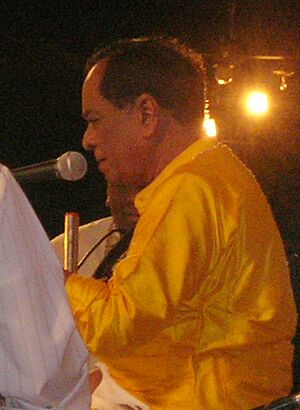M. Balamuralikrishna facts for kids
Quick facts for kids
M. Balamuralikrishna
|
|
|---|---|

Balamuralikrishna at Rajarani Music Festival, Bhubaneswar, Odisha
|
|
| Background information | |
| Birth name | Mangalampalli Balamuralikrishna |
| Born | 6 July 1930 Sankaraguptam, East Godavari District, Madras Presidency, British India (now part of Andhra Pradesh, India) |
| Died | 22 November 2016 (aged 86) Chennai, Tamil Nadu, India |
| Genres | Carnatic music |
| Occupations | Musician |
| Instruments | Viola Mridangam Kanjira |
| Years active | 1938–2016 |
| Labels | Lahari Music, Sangeetha, PM Audios & Entertainments, Aditya Music |
| Awards: Padma Vibhushan 1991 | |
Mangalampalli Balamuralikrishna (born July 6, 1930 – died November 22, 2016) was an amazing Indian musician. He was known for his incredible voice in Carnatic music, which is a classical music style from South India. He was also a talented multi-instrumentalist, meaning he could play many instruments. He sang in movies, composed music, and even acted a little!
Balamuralikrishna received many top awards for his contributions to music. These include the Padma Vibhushan in 1991, which is one of India's highest civilian honors. He also won two National Film Awards and the Sangeet Natak Akademi Award. In 1995, UNESCO gave him the Mahatma Gandhi Silver Medal, and in 2005, the French Government honored him with the Chevalier of the Ordre des Arts et des Lettres.
He started his music career at just six years old. Throughout his life, he performed over 25,000 concerts all around the world! He often performed duets, called jugalbandi, with other famous musicians like Pandit Bhimsen Joshi and Pandit Hariprasad Chaurasia. Balamuralikrishna helped make the songs of old composers like Sri Bhadrachala Ramadasu and Sri Annamacharya popular again.
His concerts were special because they mixed his amazing vocal skills and complex rhythms with music that everyone could enjoy. He performed in many countries, including the US, Canada, UK, Italy, France, and Russia. Besides his native language, Telugu, he also composed music in Kannada, Sanskrit, Tamil, Malayalam, Hindi, Bengali, and Punjabi. He even sang in French and explored jazz fusion music!
Contents
Early Life and Musical Beginnings
Balamuralikrishna was born in a Brahmin family in Sankaraguptam, which is now part of Andhra Pradesh state. His father, Mangalampalli Pattabhiramayya, was a well-known musician, and his mother, Suryakanthamma, played the veena. Sadly, his mother passed away when he was a baby, so his father raised him.
Seeing his son's strong interest in music, his father arranged for him to learn from Parupalli Ramakrishnayya Pantulu. This teacher was a direct student of Tyagaraja, a very famous Carnatic composer. Under his teacher's guidance, young Balamuralikrishna learned Carnatic music. When he was only eight years old, he gave his first full concert in Vijayawada. A performer named Musunuri Suryanarayana Murty Bhagavatar was so impressed by his talent that he added the word "Bala" (meaning "child") to his name. Before this, he was just Muralikrishna, but after that, he became known as Balamuralikrishna.
By the age of fifteen, he had already mastered all 72 melakartha ragas. These are like the main scales in Carnatic music. He even composed new songs, called krithis, in each of them. He also played the kanjira, mridangam, viola, and violin. He was the first person to bring the viola into classical Indian music, even performing solo viola concerts!
Creative Experiments in Music
Balamuralikrishna was always trying new things in music. He loved to experiment while still respecting the old traditions of Carnatic music. He even created new ragas (musical scales) like Ganapathi, Sarvashri, Mahati, and Lavangi. Some of his new ragas, like Mahathi and Lavangi, used only three or four notes!
He also came up with new tala (rhythm) systems. He made new ways to combine rhythms, making them more complex and interesting. His new rhythm systems include Trimukhi, Panchamukhi, Saptamukhi, and Navamukhi. These new systems showed his amazing creativity and deep understanding of music.
After his passing, his family started the 'Dr. M. Balamuralikrishna Memorial Trust' to keep his musical legacy alive.
His Musical Compositions
Balamuralikrishna created over 400 musical pieces. He is one of the few musicians who composed in all 72 Melakarta Ragas. He also invented new ragas with just three or four notes and even a new Tala (rhythm) system. His compositions include all types of Carnatic music, like Varnas, Krithis, Thillanas, and Bhavageethas.
Work in Cinema
Balamuralikrishna sang in many films in Telugu, Sanskrit, Malayalam, Kannada, and Tamil languages. He also acted in a few movies. His first acting role was as Narada in the Telugu film Bhakta Prahlada in 1967.
His Passing
M. Balamuralikrishna passed away peacefully in his sleep at his home in Chennai on November 22, 2016, at the age of 86. He was cremated with full state honors the next day, and thousands of people attended his funeral. He is survived by his three daughters and three sons, all of whom are doctors. His wife, Smt. Annapurna, passed away a few months later in 2017.
Awards and Special Recognitions
Balamuralikrishna received many awards and honors throughout his life for his incredible talent and contributions to the arts.
National and Civilian Honors
- Padma Shri (1971)
- Padma Bhushan
- Padma Vibhushan (1991)
- Chevalier of the Ordre des Arts et des Lettres from the Government of France (2005)
Film Awards
- Best Male Playback Singer for the Kannada movie Hamsageethe (1975)
- Best Music Direction for the Kannada film Madhvacharya (1986)
- Best Singer for Swathi Thirunal (1987)
- Best Male Playback singer for Pasanga (2009)
Other Important Awards
- Sangeet Natak Akademi Award (1975)
- Sangeetha Kalanidhi by Madras Music Academy (1978)
- Raja-Lakshmi Award (1980)
- Honorary degrees like Doctor of Letters and Doctor of Science from various universities.
- Mahatma Gandhi Silver Medal from UNESCO (1995)
A documentary film called The Melody Man was made about his life by the Government of India.
 | Percy Lavon Julian |
 | Katherine Johnson |
 | George Washington Carver |
 | Annie Easley |



